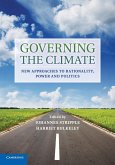Governing Climate Change
Herausgeber: Asselt, Harro van; Jordan, Andrew; Huitema, Dave
Governing Climate Change
Herausgeber: Asselt, Harro van; Jordan, Andrew; Huitema, Dave
- Gebundenes Buch
- Merkliste
- Auf die Merkliste
- Bewerten Bewerten
- Teilen
- Produkt teilen
- Produkterinnerung
- Produkterinnerung
World's foremost experts explain how polycentric thinking can enhance societal attempts to govern climate change, for researchers, practitioners, advanced students. This title is also available as Open Access.
Andere Kunden interessierten sich auch für
![Governing Climate Change Governing Climate Change]() Jolene LinGoverning Climate Change103,99 €
Jolene LinGoverning Climate Change103,99 €![Governing Climate Change Governing Climate Change]() Jolene LinGoverning Climate Change36,99 €
Jolene LinGoverning Climate Change36,99 €![Governing the Climate Governing the Climate]() Governing the Climate46,99 €
Governing the Climate46,99 €![Climate Change Policy in the European Union Climate Change Policy in the European Union]() Climate Change Policy in the European Union61,99 €
Climate Change Policy in the European Union61,99 €![The International Climate Change Regime The International Climate Change Regime]() Farhana YaminThe International Climate Change Regime244,99 €
Farhana YaminThe International Climate Change Regime244,99 €![Companies and Climate Change Companies and Climate Change]() Lisa BenjaminCompanies and Climate Change111,99 €
Lisa BenjaminCompanies and Climate Change111,99 €![Climate Change Litigation Climate Change Litigation]() Hari M. OsofskyClimate Change Litigation43,99 €
Hari M. OsofskyClimate Change Litigation43,99 €-
-
-
World's foremost experts explain how polycentric thinking can enhance societal attempts to govern climate change, for researchers, practitioners, advanced students. This title is also available as Open Access.
Hinweis: Dieser Artikel kann nur an eine deutsche Lieferadresse ausgeliefert werden.
Hinweis: Dieser Artikel kann nur an eine deutsche Lieferadresse ausgeliefert werden.
Produktdetails
- Produktdetails
- Verlag: Cambridge University Press
- Seitenzahl: 406
- Erscheinungstermin: 29. März 2018
- Englisch
- Abmessung: 250mm x 175mm x 26mm
- Gewicht: 879g
- ISBN-13: 9781108418126
- ISBN-10: 1108418120
- Artikelnr.: 50205574
- Herstellerkennzeichnung
- Libri GmbH
- Europaallee 1
- 36244 Bad Hersfeld
- gpsr@libri.de
- Verlag: Cambridge University Press
- Seitenzahl: 406
- Erscheinungstermin: 29. März 2018
- Englisch
- Abmessung: 250mm x 175mm x 26mm
- Gewicht: 879g
- ISBN-13: 9781108418126
- ISBN-10: 1108418120
- Artikelnr.: 50205574
- Herstellerkennzeichnung
- Libri GmbH
- Europaallee 1
- 36244 Bad Hersfeld
- gpsr@libri.de
Part I. Context: 1. Governing climate change polycentrically: setting the
scene Andrew Jordan, Dave Huitema, Jonas Schoenefeld, Harro van Asselt and
Johanna Forster; Part II. Actors and Domains of Governance: 2.
International governance: polycentric governing by and beyond the UNFCCC
Harro van Asselt and Fariborz Zelli; 3. National governance: the state's
role in steering polycentric action Joana Setzer and Michal Nachmany; 4.
Transnational governance: charting new directions post-Paris Harriet
Bulkeley, Michele Betsill, Daniel Compagnon, Thomas Hale, Matthew Hoffmann,
Peter Newell and Matthew Paterson; 5. City and subnational governance: high
ambitions, innovative instruments and polycentric collaborations? Jeroen
van der Heijden; Part III. Polycentric Governance Processes: 6.
Experimentation: the politics of innovation and learning in polycentric
governance Jan-Peter Voß and Fabian Schroth; 7. Entrepreneurship: a key
driver of polycentric governance? Elin Lerum Boasson; 8. Leadership and
pioneership: exploring their role in polycentric governance Duncan
Liefferink and Rüdiger K. W. Wurzel; 9. Diffusion: an outcome of and an
opportunity for polycentric activity? Jale Tosun; 10. Linkages:
understanding their role in polycentric governance Philipp Pattberg, Sander
Chan, Lisa Sanderink and Oscar Widerberg; 11. Orchestration: strategic
ordering in polycentric governance Kenneth W. Abbott; 12. Policy
surveillance: its role in monitoring, reporting, evaluating and learning
Joseph E. Aldy; Part IV. Substantive Governance Challenges: 13. Harnessing
the market: trading in carbon allowances Katja Biedenkopf and Jørgen
Wettestad; 14. Decarbonisation: the politics of transformation Steven
Bernstein and Matthew Hoffmann; 15. Transferring technologies: the
polycentric governance of clean energy technology Liliana B. Andonova,
Paula Castro and Kathryn Chelminski; 16. Governing experimental responses:
negative emissions technologies and solar climate engineering Jesse
Reynolds; 17. Adaptation: the neglected dimension of polycentric climate
governance? Robbert Biesbroek and Alexandra Lesnikowski; 18. Equity and
justice in polycentric climate governance Chukwumerije Okereke; 19.
Legitimacy and accountability in polycentric climate governance Karin
Bäckstrand, Fariborz Zelli and Philip Schleifer; Part V. Synthesis and
Conclusions: 20. Governing climate change: the promise and limits of
polycentric governance Andrew Jordan, Dave Huitema, Harro van Asselt and
Johanna Forster; Index.
scene Andrew Jordan, Dave Huitema, Jonas Schoenefeld, Harro van Asselt and
Johanna Forster; Part II. Actors and Domains of Governance: 2.
International governance: polycentric governing by and beyond the UNFCCC
Harro van Asselt and Fariborz Zelli; 3. National governance: the state's
role in steering polycentric action Joana Setzer and Michal Nachmany; 4.
Transnational governance: charting new directions post-Paris Harriet
Bulkeley, Michele Betsill, Daniel Compagnon, Thomas Hale, Matthew Hoffmann,
Peter Newell and Matthew Paterson; 5. City and subnational governance: high
ambitions, innovative instruments and polycentric collaborations? Jeroen
van der Heijden; Part III. Polycentric Governance Processes: 6.
Experimentation: the politics of innovation and learning in polycentric
governance Jan-Peter Voß and Fabian Schroth; 7. Entrepreneurship: a key
driver of polycentric governance? Elin Lerum Boasson; 8. Leadership and
pioneership: exploring their role in polycentric governance Duncan
Liefferink and Rüdiger K. W. Wurzel; 9. Diffusion: an outcome of and an
opportunity for polycentric activity? Jale Tosun; 10. Linkages:
understanding their role in polycentric governance Philipp Pattberg, Sander
Chan, Lisa Sanderink and Oscar Widerberg; 11. Orchestration: strategic
ordering in polycentric governance Kenneth W. Abbott; 12. Policy
surveillance: its role in monitoring, reporting, evaluating and learning
Joseph E. Aldy; Part IV. Substantive Governance Challenges: 13. Harnessing
the market: trading in carbon allowances Katja Biedenkopf and Jørgen
Wettestad; 14. Decarbonisation: the politics of transformation Steven
Bernstein and Matthew Hoffmann; 15. Transferring technologies: the
polycentric governance of clean energy technology Liliana B. Andonova,
Paula Castro and Kathryn Chelminski; 16. Governing experimental responses:
negative emissions technologies and solar climate engineering Jesse
Reynolds; 17. Adaptation: the neglected dimension of polycentric climate
governance? Robbert Biesbroek and Alexandra Lesnikowski; 18. Equity and
justice in polycentric climate governance Chukwumerije Okereke; 19.
Legitimacy and accountability in polycentric climate governance Karin
Bäckstrand, Fariborz Zelli and Philip Schleifer; Part V. Synthesis and
Conclusions: 20. Governing climate change: the promise and limits of
polycentric governance Andrew Jordan, Dave Huitema, Harro van Asselt and
Johanna Forster; Index.
Part I. Context: 1. Governing climate change polycentrically: setting the
scene Andrew Jordan, Dave Huitema, Jonas Schoenefeld, Harro van Asselt and
Johanna Forster; Part II. Actors and Domains of Governance: 2.
International governance: polycentric governing by and beyond the UNFCCC
Harro van Asselt and Fariborz Zelli; 3. National governance: the state's
role in steering polycentric action Joana Setzer and Michal Nachmany; 4.
Transnational governance: charting new directions post-Paris Harriet
Bulkeley, Michele Betsill, Daniel Compagnon, Thomas Hale, Matthew Hoffmann,
Peter Newell and Matthew Paterson; 5. City and subnational governance: high
ambitions, innovative instruments and polycentric collaborations? Jeroen
van der Heijden; Part III. Polycentric Governance Processes: 6.
Experimentation: the politics of innovation and learning in polycentric
governance Jan-Peter Voß and Fabian Schroth; 7. Entrepreneurship: a key
driver of polycentric governance? Elin Lerum Boasson; 8. Leadership and
pioneership: exploring their role in polycentric governance Duncan
Liefferink and Rüdiger K. W. Wurzel; 9. Diffusion: an outcome of and an
opportunity for polycentric activity? Jale Tosun; 10. Linkages:
understanding their role in polycentric governance Philipp Pattberg, Sander
Chan, Lisa Sanderink and Oscar Widerberg; 11. Orchestration: strategic
ordering in polycentric governance Kenneth W. Abbott; 12. Policy
surveillance: its role in monitoring, reporting, evaluating and learning
Joseph E. Aldy; Part IV. Substantive Governance Challenges: 13. Harnessing
the market: trading in carbon allowances Katja Biedenkopf and Jørgen
Wettestad; 14. Decarbonisation: the politics of transformation Steven
Bernstein and Matthew Hoffmann; 15. Transferring technologies: the
polycentric governance of clean energy technology Liliana B. Andonova,
Paula Castro and Kathryn Chelminski; 16. Governing experimental responses:
negative emissions technologies and solar climate engineering Jesse
Reynolds; 17. Adaptation: the neglected dimension of polycentric climate
governance? Robbert Biesbroek and Alexandra Lesnikowski; 18. Equity and
justice in polycentric climate governance Chukwumerije Okereke; 19.
Legitimacy and accountability in polycentric climate governance Karin
Bäckstrand, Fariborz Zelli and Philip Schleifer; Part V. Synthesis and
Conclusions: 20. Governing climate change: the promise and limits of
polycentric governance Andrew Jordan, Dave Huitema, Harro van Asselt and
Johanna Forster; Index.
scene Andrew Jordan, Dave Huitema, Jonas Schoenefeld, Harro van Asselt and
Johanna Forster; Part II. Actors and Domains of Governance: 2.
International governance: polycentric governing by and beyond the UNFCCC
Harro van Asselt and Fariborz Zelli; 3. National governance: the state's
role in steering polycentric action Joana Setzer and Michal Nachmany; 4.
Transnational governance: charting new directions post-Paris Harriet
Bulkeley, Michele Betsill, Daniel Compagnon, Thomas Hale, Matthew Hoffmann,
Peter Newell and Matthew Paterson; 5. City and subnational governance: high
ambitions, innovative instruments and polycentric collaborations? Jeroen
van der Heijden; Part III. Polycentric Governance Processes: 6.
Experimentation: the politics of innovation and learning in polycentric
governance Jan-Peter Voß and Fabian Schroth; 7. Entrepreneurship: a key
driver of polycentric governance? Elin Lerum Boasson; 8. Leadership and
pioneership: exploring their role in polycentric governance Duncan
Liefferink and Rüdiger K. W. Wurzel; 9. Diffusion: an outcome of and an
opportunity for polycentric activity? Jale Tosun; 10. Linkages:
understanding their role in polycentric governance Philipp Pattberg, Sander
Chan, Lisa Sanderink and Oscar Widerberg; 11. Orchestration: strategic
ordering in polycentric governance Kenneth W. Abbott; 12. Policy
surveillance: its role in monitoring, reporting, evaluating and learning
Joseph E. Aldy; Part IV. Substantive Governance Challenges: 13. Harnessing
the market: trading in carbon allowances Katja Biedenkopf and Jørgen
Wettestad; 14. Decarbonisation: the politics of transformation Steven
Bernstein and Matthew Hoffmann; 15. Transferring technologies: the
polycentric governance of clean energy technology Liliana B. Andonova,
Paula Castro and Kathryn Chelminski; 16. Governing experimental responses:
negative emissions technologies and solar climate engineering Jesse
Reynolds; 17. Adaptation: the neglected dimension of polycentric climate
governance? Robbert Biesbroek and Alexandra Lesnikowski; 18. Equity and
justice in polycentric climate governance Chukwumerije Okereke; 19.
Legitimacy and accountability in polycentric climate governance Karin
Bäckstrand, Fariborz Zelli and Philip Schleifer; Part V. Synthesis and
Conclusions: 20. Governing climate change: the promise and limits of
polycentric governance Andrew Jordan, Dave Huitema, Harro van Asselt and
Johanna Forster; Index.








